
The Great Train Robbery is a 1903 American silent film made by Edwin S. Porter for the Edison Manufacturing Company. It follows a gang of outlaws who hold up and rob a steam locomotive at a station in the American West, flee across mountainous terrain, and are finally defeated by a posse of locals. The short film draws on many sources, including a robust existing tradition of Western films, recent European innovations in film technique, the play of the same name by Scott Marble, the popularity of train-themed films, and possibly real-life incidents involving outlaws such as Butch Cassidy.
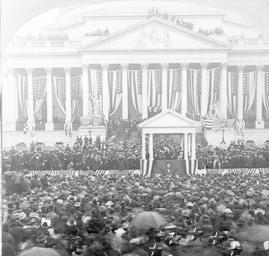
President McKinley Inauguration Footage is the name given to two different short documentary films which were combined as one. The two titles are President McKinley Taking the Oath and President McKinley and Escort Going to the Capitol. The two show President William McKinley arriving at the United States Capitol in order to take the oath of office of the president of the United States as part of his second inauguration on March 4, 1901.
The year 1901 in film involved some significant events.
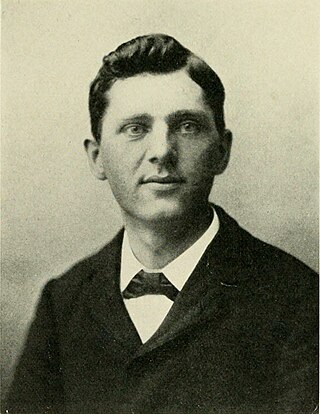
Leon F. Czolgosz was an American laborer and anarchist who assassinated President William McKinley on September 6, 1901, in Buffalo, New York. The president died on September 14 after his wound became infected. Caught in the act, Czolgosz was tried, convicted, and executed by the State of New York seven weeks later on October 29, 1901.

George Bruce Cortelyou was an American cabinet secretary of the early twentieth century. He served in various capacities in the presidential administrations of Grover Cleveland, William McKinley, and Theodore Roosevelt.
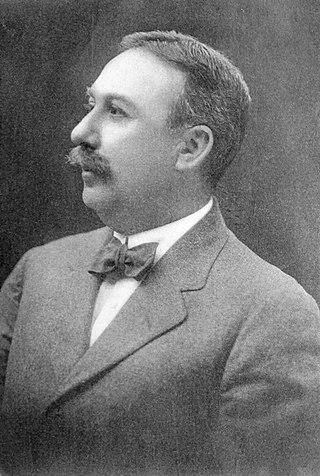
Edwin Stanton Porter was an American film pioneer, most famous as a producer, director, studio manager and cinematographer with the Edison Manufacturing Company and the Famous Players Film Company. Of over 250 films created by Porter, his most important include What Happened on Twenty-third Street, New York City (1901), Jack and the Beanstalk (1902), Life of an American Fireman (1903), The Great Train Robbery (1903), The European Rest Cure (1904), The Kleptomaniac (1905), Life of a Cowboy (1906), Rescued from an Eagle's Nest (1908), and The Prisoner of Zenda (1913).
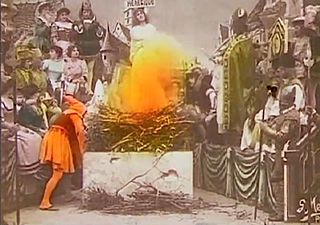
Joan of Arc is a 1900 French silent film directed by Georges Méliès, based on the life of Joan of Arc.

Life of an American Fireman is a short, silent film Edwin S. Porter made for the Edison Manufacturing Company. It was shot late in 1902 and distributed early in 1903. One of the earliest American narrative films, it depicts the rescue of a woman and child from a burning building. It bears notable similarities to the 1901 British short film Fire!, directed by James Williamson.

William McKinley, the 25th president of the United States, was shot on the grounds of the Pan-American Exposition in the Temple of Music in Buffalo, New York, on September 6, 1901, six months into his second term. He was shaking hands with the public when an anarchist, Leon Czolgosz, shot him twice in the abdomen. McKinley died on September 14 of gangrene caused by the wounds. He was the third American president to be assassinated, following Abraham Lincoln in 1865 and James A. Garfield in 1881.

The Night Before Christmas is a 1905 American silent short film directed by Edwin S. Porter for the Edison Manufacturing Company. It closely follows Clement Clarke Moore's 1823 poem Twas the Night Before Christmas, and was the first film production of the poem.
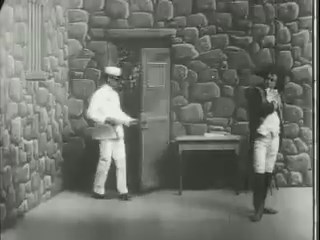
Maniac Chase is a 1904 American short silent comedy film directed by Edwin S. Porter and produced by the Edison Manufacturing Company. The film is a remake of The Escaped Lunatic, a film directed by Wallace McCutcheon Sr. released at the beginning of 1904. This was one of two Biograph Company hits remade by Edison's company in fall 1904, the other being Personal, which was copied as How a French Nobleman Got a Wife Through the New York Herald Personal Columns.
Charles John Musser is a film historian, documentary filmmaker, and a film editor. Since 1992, he has taught at Yale University, where he is currently a professor of Film and Media Studies as well as American Studies and Theater Studies. His research has primarily focused on early cinema, and topics such as Edwin S. Porter, Oscar Micheaux, race cinema of the silent era, Paul Robeson, film performance, as well as a variety of issues and individuals in documentary. His films include An American Potter (1976), Before the Nickelodeon: The Early Cinema of Edwin S. Porter (1982) and Errol Morris: A Lightning Sketch (2014).

Terrible Teddy, the Grizzly King is a 1901 American silent film directed by Edwin S. Porter. Produced by the Edison Manufacturing Company, it is the earliest known political satire in American film. It features three actors, all of whom are unknown.
Wallace McCutcheon Sr. was a pioneer cinematographer and director in the early American motion picture industry, working with the American Mutoscope & Biograph, Edison and American Star Film companies. McCutcheon's wealth of credits are often mixed up with the small handful of films directed by his son, Wallace McCutcheon Jr. (1884–1928).
George S. Fleming was an American actor, director, and scenic designer whose short films were influential early projects in the medium.

Execution of Czolgosz with Panorama of Auburn Prison is a 1901 silent film produced by the Edison Studios arms of Edison Manufacturing Company. The film is a dramatic reenactment of the execution of Leon Czolgosz by electric chair at Auburn Correctional Facility following his 1901 conviction for the assassination of William McKinley. It is considered an important film in the history of cinema.

Kansas Saloon Smashers is a 1901 comedy short film produced and distributed by Edison Studios. Directed by Edwin S. Porter, it is a satire of American activist Carrie Nation. The film portrays Nation and her followers entering and destroying a saloon. After the bartender retaliates by spraying Nation with water, policemen order them out; the identities of the actors are not known. Inspiration for the film was provided by an editorial cartoon which appeared in the New York Evening Journal.

The Train Wreckers is a 1905 American silent drama film, directed by Edwin S. Porter. In the film, the daughter of a railway switchman and lover of a locomotive engineer defeats outlaws trying to derail a train.

The 'Teddy' Bears is an American silent film directed by Edwin S. Porter and Wallace McCutcheon, and produced by the Edison Manufacturing Company starting as the fairy tale Goldilocks and ending as a political satire of United States President Theodore Roosevelt.

College Chums is an American silent film directed by Edwin S. Porter, and produced by the Edison Manufacturing Company.
















